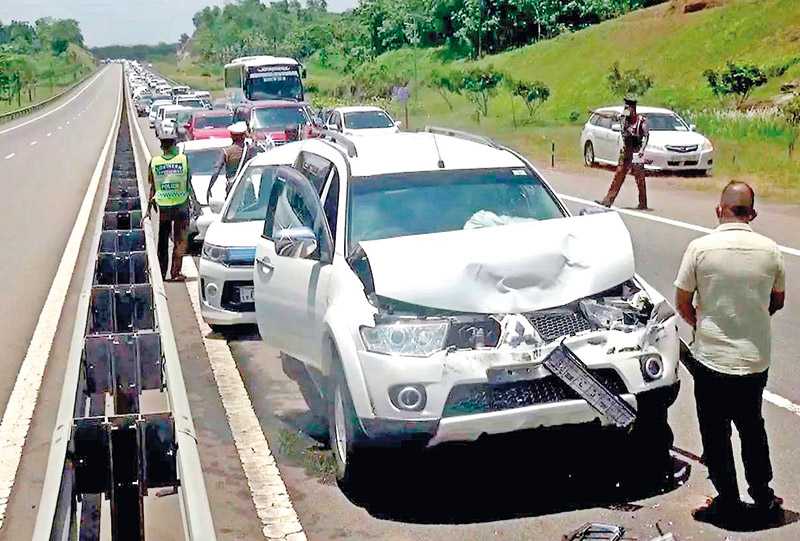Sunday Jan 11, 2026
Sunday Jan 11, 2026
Friday, 30 April 2021 01:00 - - {{hitsCtrl.values.hits}}

Physical improvements and fines are necessary, but they must be implemented in parallel to cultivating a law-abiding culture through education from kindergartens through universities
By Prianka Nalin Seneviratne
Each road crash causes grief and financial hardship to families, regardless of the cause. In March and April, myriad local newspapers highlighted the problem and offered solutions to road crashes.
They reported that 1,054 crashes have occurred in the first quarter of this year, about 200 victims have been treated at the Colombo National Hospital each month, 520 have died and 3,000 had received minor injuries. They also reported that the estimated annual cost of treating crash victims and ‘loss of labour’ in 2018 was Rs. 130 billion. The true cost when property damage, insurance, interruptions to traffic, policing, etc. are added, the total will be substantially higher. These numbers suggest that the impact of road crashes is higher than of COVID-19. Albeit this, successive governments have failed to act.
There is no shortage of solutions and opinions on how to reduce crashes. Some academics think that introducing a ‘de-merit system’ and fixing ‘hotspots – junctions, bends or pedestrian crossings’ are the remedies. One has claimed that this would halve the crashes within five years. Highway Ministry Secretary has proposed ‘warning signboards, speed bumps, rumble or alert strips will be put up in high risk, hilly terrain areas’.
A retired police officer has suggested ‘deploying more traffic police officers with ad hoc testing in and around night clubs, in city and suburban roads’. A medical specialist has said, “It’s time to start testing for other substance use too.” In March this year, the Police Spokesperson said, “Most deaths are caused by reckless driving and drink-driving,” and announced fines for driving with worn-out tires.
Despite fewer trips and less traffic, crashes in 2020 and 2021 are higher than previous years in other countries too. These countries have researched the causes (speeding, failing to wear seatbelts and follow traffic rules, etc.) and attributed them to increased stress, boredom, and substance use. In Sri Lanka, one can add families travelling in three-wheelers and motorcycles, especially on inter-city trips and freight movement, and increased use of construction vehicles for moving goods to the causes. This has changed the traffic mix on the roads in the last 12 months, which has increased the speed differential among vehicles resulting in riskier behaviour—rash over-taking manoeuvres, overloading trucks, and not using seatbelts and helmets.
Reckless drivers and bicyclists and errant pedestrians are universal phenomena. But the percentage of people driving, riding, and walking without caring for others and the rule of law in Sri Lanka has always been higher than in developing countries. So, the Police Spokesperson has hit the nail right on the head when he said that most deaths are caused by reckless driving. A penalty for using worn out tyres is not a cure. Even a layman can see some obvious reasons for reckless driving.
One is the low value people apparently place on the consequence of a crash, whether its death or injury. This is evident from the mothers cuddling babies on pillions and in the front seats of vehicles instead of in car seats, five passengers in a three-wheeler, overtaking on the left or in the right lane even under heavy on-coming traffic. Reasons for this behaviour are also obvious. Lack of alternative transport modes, either because they are unavailable or unreliable, illogical traffic control methods and devices, lack of parking, strip development along major roads, commercial activity in residential zones, impatience, selfishness, to name but a few.
Can this behaviour be changed and sustained by hotspot correction, fines for worn out tyres, more police on the roads (in Colombo mostly at intersections), demerit points, etc.? Highly unlikely. Physical improvements and fines are necessary, but they must be implemented in parallel to cultivating a law-abiding culture through education from kindergartens through universities. In the ’60s, Traffic Police operated a model street network in Vihara Maha Devi Park for kids to learn safe riding and driving habits. In the United States, police officers visit elementary and high schools at the beginning of each academic year to talk of road safety, substance abuse, and sometimes careers in the police force.
A culture change is not only needed to reduce traffic safety, but for improving the environment, health, and labour productivity. The next generation of Sri Lankans must be continually made aware of their rights and obligations throughout their formative years. The governments must start investing in primary education, as a first step, and build a system of schools of equal quality, across the country that will instil values and discipline. Without this, traffic safety investment, port cities, seaports, airports, and financial hubs is unsustainable.
(The writer is a Professor of Civil Engineering.)